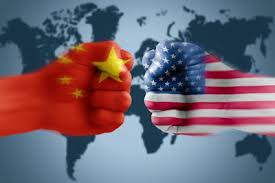
New sanctions on Chinese officials and companies were imposed this week by the Trump administration of the United States over alleged misdeeds in the South China Sea while also imposing a ban on American investing in nine more Chinese companies in what is being viewed as another hit on China and its biggest companies.
These measures were announced just days prior to Trump handing over the presidency to president-elect Joe Biden.
New restrictions and sanctions for the alleged use of coercion against states with rival claims in the South China Sea were imposed by the Trump administration on executives of Chinese state owned companies, officials of the Chinese Communist Party and military as well as the Chinese oil giant CNOOC.
The new restrictions on CNOOC will be applicable on crude, refined fuels and liquid natural gas but will not be implementable on the existing joint ventures of CNOOC that are not located or do not have operations in the South China Sea, senior US officials told reporters earlier this week.
The US also added nine new Chinese companies to the list of companies of the Pentagon that the US alleges has ties to the Chinese military. The newly added companies include smartphone maker Xiaomi Corp and the plane maker Comac.
Under the latest sanctions, all investments in these companies by US nationals and organization will be prevented and those already invested will have to divest their investment by November 11, 2021.
China firmly opposed the new sanctions, said Chinese foreign ministry spokesman Zhao Lijian in Beijing on Friday. "This action is against the trend of the times and is against its self touted market competition and international economic trade rules," he said.
There were no comments made on the issue from the Biden transition team.
The news pushed share price of Xiaomi by 10 per cent on Friday compared to an overall drop of 0.4 per cent in the Hang Seng index.
China's territorial claims in the South China Sea have been opposed by the US for a long time now. The South China Sea is rich in resources and is also a very important trade route. China has been accused by the US of intimidating the smaller countries in the region such as Vietnam and the Philippines who have also laid claims on the South China Sea.
On the other hand, the US has been accused by China of attempting to harm the stability of the region by sending warships and planes to the region.
"The United States stands with Southeast Asian claimant states seeking to defend their sovereign rights and interests, consistent with international law," US Secretary of State Mike Pompeo said in announcing the sanctions.
Executives of Chinese state-owned enterprises and officials of the Chinese Communist Party and navy will have to face visa restrictions by the US, Pompeo said.
Pompeo said that the latest sanctions were targeted against those "responsible for, or complicit in, either the large-scale reclamation, construction, or militarization of disputed outposts in the South China Sea, or use of coercion against Southeast Asian claimants to inhibit their access to offshore resources."
(Source:www:hindustantimes.com)
These measures were announced just days prior to Trump handing over the presidency to president-elect Joe Biden.
New restrictions and sanctions for the alleged use of coercion against states with rival claims in the South China Sea were imposed by the Trump administration on executives of Chinese state owned companies, officials of the Chinese Communist Party and military as well as the Chinese oil giant CNOOC.
The new restrictions on CNOOC will be applicable on crude, refined fuels and liquid natural gas but will not be implementable on the existing joint ventures of CNOOC that are not located or do not have operations in the South China Sea, senior US officials told reporters earlier this week.
The US also added nine new Chinese companies to the list of companies of the Pentagon that the US alleges has ties to the Chinese military. The newly added companies include smartphone maker Xiaomi Corp and the plane maker Comac.
Under the latest sanctions, all investments in these companies by US nationals and organization will be prevented and those already invested will have to divest their investment by November 11, 2021.
China firmly opposed the new sanctions, said Chinese foreign ministry spokesman Zhao Lijian in Beijing on Friday. "This action is against the trend of the times and is against its self touted market competition and international economic trade rules," he said.
There were no comments made on the issue from the Biden transition team.
The news pushed share price of Xiaomi by 10 per cent on Friday compared to an overall drop of 0.4 per cent in the Hang Seng index.
China's territorial claims in the South China Sea have been opposed by the US for a long time now. The South China Sea is rich in resources and is also a very important trade route. China has been accused by the US of intimidating the smaller countries in the region such as Vietnam and the Philippines who have also laid claims on the South China Sea.
On the other hand, the US has been accused by China of attempting to harm the stability of the region by sending warships and planes to the region.
"The United States stands with Southeast Asian claimant states seeking to defend their sovereign rights and interests, consistent with international law," US Secretary of State Mike Pompeo said in announcing the sanctions.
Executives of Chinese state-owned enterprises and officials of the Chinese Communist Party and navy will have to face visa restrictions by the US, Pompeo said.
Pompeo said that the latest sanctions were targeted against those "responsible for, or complicit in, either the large-scale reclamation, construction, or militarization of disputed outposts in the South China Sea, or use of coercion against Southeast Asian claimants to inhibit their access to offshore resources."
(Source:www:hindustantimes.com)














